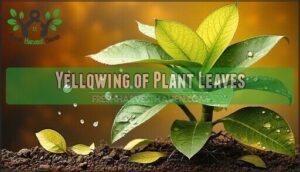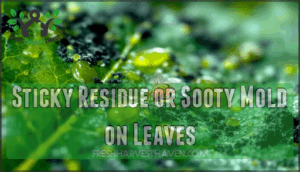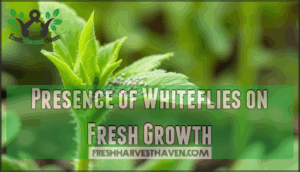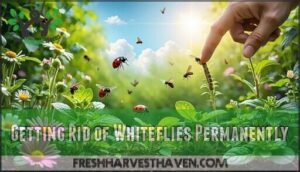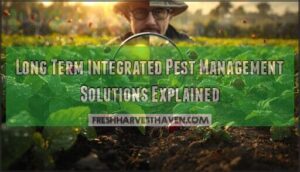This site is supported by our readers. We may earn a commission, at no cost to you, if you purchase through links.
 You spray, you prune, you fertilize—and still, clouds of tiny white insects rise from your tomatoes like dust every time you brush past. Whiteflies don’t just annoy; they drain plant sap, spread viruses, and coat leaves in sticky honeydew that invites mold. Left unchecked, they can slash crop yields by half or more.
You spray, you prune, you fertilize—and still, clouds of tiny white insects rise from your tomatoes like dust every time you brush past. Whiteflies don’t just annoy; they drain plant sap, spread viruses, and coat leaves in sticky honeydew that invites mold. Left unchecked, they can slash crop yields by half or more.
Chemical pesticides often backfire, killing beneficial insects while whiteflies develop resistance within weeks. Natural remedies for whitefly infestation offer a smarter path forward, combining immediate knockdown tactics with long-term prevention strategies that work with your garden’s ecosystem instead of against it.
From targeted soap sprays to predator-friendly planting schemes, these methods give you back control without compromising plant health or soil vitality.
Table Of Contents
- Key Takeaways
- What Are Whiteflies
- Signs of a Whitefly Infestation
- Natural Remedies for Whitefly Infestation
- Getting Rid of Whiteflies Permanently
- Preventing Whiteflies in The Garden
- Long-term Protection From Whiteflies
- Frequently Asked Questions (FAQs)
- What is the best homemade whitefly spray?
- What are the natural enemies of whiteflies?
- What kills whitefly eggs?
- How do you get rid of whiteflies naturally?
- What is the best homemade spray for whiteflies?
- Does vinegar kill white flies?
- Will Dawn dish soap kill whiteflies?
- What is the best natural way to get rid of whiteflies?
- What is a homemade recipe to kill whiteflies?
- Does apple cider vinegar kill white fly?
- Conclusion
Key Takeaways
- Whiteflies drain plant sap, spread viruses, and excrete sticky honeydew that invites sooty mold—reducing crop yields by 20-100% if left unchecked, while chemical pesticides often backfire by killing beneficial insects and breeding resistant populations.
- Effective natural control combines immediate knockdown tactics (castile soap spray, neem oil, water blasts, or handheld vacuuming) with habitat modifications like reflective mulch, yellow sticky traps, and removing heavily damaged leaves to disrupt whitefly breeding cycles.
- Long-term prevention requires layered strategies: proper plant nutrition through balanced organic fertilizers, companion planting with marigolds and basil to repel pests, and introducing natural predators like ladybugs, lacewings, and parasitic wasps that achieve 45-90% population reductions.
- Weekly monitoring of leaf undersides catches infestations early—before populations explode through their rapid 16-31 day life cycle—allowing you to intervene during vulnerable stages and maintain garden balance without constant chemical intervention.
What Are Whiteflies
Whiteflies aren’t just a nuisance—they’re tiny sap-sucking insects that can devastate your plants if left unchecked. These small white-winged pests cluster on the undersides of leaves, weakening plants while spreading diseases that can wipe out entire crops.
Understanding what whiteflies are and how they operate is your first step toward taking back control of your garden.
Characteristics of Whiteflies
When these miniature winged invaders blanket your garden, they’re not just a nuisance—they’re actively draining the life from your plants, one microscopic sip at a time. Whiteflies measure just 1-2mm long, sporting powdery white wings and pale yellow bodies that cluster beneath leaves.
These sap-feeders inject toxic saliva while feeding, weakening plant tissue and triggering yellowing. The whitefly life cycle progresses rapidly through egg, larvae, and adult stages, with each generation producing sticky honeydew that attracts secondary problems.
Over 1,500 species exist worldwide, but natural predators like lacewings help keep populations in check.
Effects of Whiteflies on Plants
Sap extraction by whiteflies doesn’t just weaken your plants—it triggers a cascade of damage that can devastate entire crops. These pests pierce plant tissue to feed on phloem sap, causing direct metabolic disruptions that leave plants struggling to survive. Virus transmission amplifies the threat, as whiteflies vector over 200 plant viruses that can reduce yields by 20-100%. The sticky honeydew they excrete becomes a breeding ground for sooty mold, blocking sunlight and further compromising plant health. Understanding whitefly biology is essential, and learning about whitefly management can help prevent infestations.
Here’s how whitefly infestation escalates:
- Sap extraction causes chlorosis, wilting, and premature leaf drop
- Plant damage from toxic saliva creates blanched stems and discolored patches
- Honeydew effects attract sooty mold that reduces photosynthesis
- Virus transmission spreads diseases like tomato yellow leaf curl
- Crop losses can reach 100% in severe infestations, costing billions globally
Understanding the whitefly life cycle helps you intercept damage before it compounds.
Life Cycle of Whiteflies
Understanding this rapid reproductive cycle is your first line of defense—whiteflies can explode from a few individuals to thousands in just weeks if conditions favor them.
Whiteflies can explode from a few individuals to thousands in just weeks if conditions favor them—understanding this rapid reproductive cycle is your first line of defense
Females deposit whitefly eggs in clusters on leaf undersides, with the egg stage lasting 5-9 days depending on temperature. Larval development progresses through four nymphal instars where immobile whitefly larvae feed continuously, followed by pupal formation. The molting process between instars allows growth, and adult emergence occurs after 16-31 days total.
This whitefly life cycle creates overlapping generations that accelerate whitefly infestation exponentially.
Signs of a Whitefly Infestation
Catching a whitefly problem early can save your plants from serious damage. You’ll need to know what to look for—these pests leave behind telltale signs that are easy to spot once you know where to check.
Here’s how to identify an active infestation before it spirals out of control.
Yellowing of Plant Leaves
If your plant’s leaves are fading to yellow, whiteflies might be draining the life right out of them—literally sucking away the nutrients and energy your greenery needs to thrive. This leaf damage signals plant stress and nutrient deficiency from whitefly infestation, disrupting photosynthesis. Yellowing compromises foliage health while weakening soil quality uptake.
- Stunted growth halts plant vigor
- Wilting foliage indicates severe stress
- Crop decline threatens harvest
- Rapid spreading endangers nearby plants
Combat infestations with natural remedies like neem oil for effective whitefly control.
Sticky Residue or Sooty Mold on Leaves
That shiny, sticky coating on your leaves isn’t morning dew—it’s honeydew, a sugary waste product whiteflies leave behind as they feast on plant sap. This residue attracts sooty mold, a black fungal growth that blocks sunlight and disrupts photosynthesis, accelerating plant decay. You’ll notice leaf damage appearing as dark, grimy patches across foliage surfaces.
Early residue removal with a gentle soap-and-water wash prevents fungal growth from taking hold. For active whitefly infestation, apply neem oil to kill pests while cleaning sticky honeydew simultaneously.
Check leaf undersides regularly—that’s where whiteflies cluster and produce the most residue. Addressing both the sticky honeydew and the insects themselves through natural remedies stops sooty mold before it weakens your plants further.
Presence of Whiteflies on Fresh Growth
Whiteflies don’t just land randomly—they zero in on your plant’s tender new growth like it’s an all-you-can-eat buffet. Fresh growth damage appears heaviest on seedlings, young transplants, and actively expanding shoot tips where nutrient-rich sap flows most abundantly. This whitefly attraction to vulnerable growth stages creates predictable infestation patterns you can exploit for early detection.
Check these high-risk zones during routine inspections:
- Emerging foliage and buds where plant vulnerability peaks and growth stage susceptibility makes rapid colonization possible
- Leaf undersides on new growth where clustered whiteflies indicate active whitefly infestation requiring immediate intervention
- Areas near sticky traps to monitor population levels before applying neem oil or introducing natural predators
Target these zones first when applying control measures.
Natural Remedies for Whitefly Infestation

Once you’ve spotted whiteflies on your plants, you’ll want to act fast before the infestation spreads. The good news is that you don’t need harsh chemicals to win this battle.
Here are five natural remedies that’ll help you reclaim your garden from these sap-sucking pests.
Spray Them Off With a Water Hose
Your garden hose isn’t just for watering—it’s a powerful weapon that can blast whiteflies right off your plants. Aim the hose nozzle directly at leaf undersides where these pests congregate, adjusting water pressure to a moderate-strong setting that dislodges insects without damaging foliage. Cool water temperature works best for this spray technique during early morning hours.
This natural pest control method drowns whiteflies on contact and disrupts their breeding cycle. Repeat the process every few days to maintain control, as this homemade spray alternative requires consistency to break population growth effectively.
Vacuum Them With a Handheld Vacuum
When whitefly populations spiral out of control, sometimes the simplest technology sitting in your closet becomes your most strategic ally. A handheld vacuum provides precise insect removal techniques without chemicals, making it an effective natural remedy for whiteflies. This whitefly suction method targets adults directly where they congregate—underneath leaves.
Handheld Vacuum Tips for Controlling Whiteflies:
- Set suction to low-moderate strength to prevent leaf damage while capturing pests
- Work during early morning when whiteflies move sluggishly and remain stationary
- Focus vacuuming frequency at every 2-3 days to interrupt reproductive cycles
- Immediately seal and freeze the collection bag for 24 hours before disposal
These suction control methods disrupt whitefly infestation patterns effectively. The mechanical action removes adults before they lay eggs, breaking the population cycle through consistent application rather than chemical intervention.
Castile Soap Spray
Castile soap acts like a natural shield-breaker against whitefly infestations, dissolving the protective outer layer of these soft-bodied pests. This soap spray efficacy stems from its surfactant properties—studies show 80–95% mortality rates upon contact. The castile soap benefits extend beyond immediate knockdown: it’s safe for food crops, leaves no toxic residues, and aids organic gardening methods when integrated into natural pest control strategies.
Soap solution preparation for effective whitefly control:
- Mix 1 tablespoon castile soap with 1 quart water for ideal 1–1.5% concentration
- Spray both leaf surfaces thoroughly during early morning or late afternoon
- Allow 1–2 hours contact time before rinsing to prevent residue buildup
- Repeat applications every 4 days for 2–3 weeks to disrupt life cycles
- Test on small plant area first to assess sensitivity before full treatment
This homemade spray targets whitefly infestation at multiple life stages while protecting beneficial insects like bees and ladybugs. For more information on using castile soap for garden pest control, it’s essential to follow the recommended dilution ratios.
Neem Oil Spray
Azadirachtin—the active compound in Neem Oil—disrupts whitefly feeding patterns and blocks reproduction cycles at multiple life stages. This Natural Insecticide suffocates adult Trialeurodes vaporariorum while preventing larvae from molting, offering dual-action Pest Control without harming beneficial Natural Predators like ladybugs or lacewings.
For effective Spray Application, mix 1–2 tablespoons cold-pressed Neem oil per gallon of water with a few drops of liquid soap as an emulsifier. Coat both upper and lower leaf surfaces thoroughly during early morning or evening hours when temperatures stay below 85°F—high heat reduces efficacy. Reapply every 7–10 days until your Whitefly Infestation clears.
The Neem Oil Benefits extend beyond immediate knockdown: it creates a protective barrier that repels new colonizers while remaining safe for Organic Gardening practices and food crops. Unlike synthetic pesticides, neem oil biodegrades naturally and won’t contaminate soil or groundwater.
Homemade Spray With Neem Oil and Castile Soap
Combining these two ingredients amplifies their individual strengths, creating a synergistic formula that penetrates whitefly defenses more effectively than either component alone. The castile soap helps neem oil spread evenly across leaf surfaces while breaking down the insects’ waxy coating—allowing azadirachtin to work faster.
To prepare your DIY spray:
- Mix 1 teaspoon cold-pressed neem oil with ¼ teaspoon castile soap
- Add to 1 quart warm water and shake vigorously
- Spray leaf undersides thoroughly at dawn or dusk
- Reapply every 5–7 days until infestation clears
Getting Rid of Whiteflies Permanently
Once you’ve tackled the immediate whitefly problem, you’ll want to lock in your success with a few strategic moves. The key is combining quick action with ongoing protection so these pests don’t bounce back.
Here’s how to get rid of whiteflies for good.
Remove Most Damaged Leaves From The Plant
Severely damaged foliage acts as a breeding ground for whiteflies, so removing it quickly cuts off their stronghold and gives your plant a fighting chance.
Inspect your plant and identify leaves showing heavy yellowing, sticky residue, or sooty mold—these are prime candidates for leaf removal. Use clean pruning shears to cut them at the base, working from the most damaged areas outward.
This damage assessment and leaf pruning redirects the plant’s energy toward healthy tissue, accelerating plant recovery while eliminating whitefly nurseries in one strategic move.
Clean Leaves and Stems With DIY Whitefly Spray
Once the worst foliage is gone, a thorough wash-down with homemade spray knocks out the whiteflies still clinging to your plant’s leaves and stems.
Mix your DIY whitefly spray using one of these natural remedies:
- Soap spray recipes: Combine 1 tablespoon castile soap per quart of water for immediate contact kill
- Neem oil benefits: Add 2 teaspoons neem oil plus ½ teaspoon dish soap to disrupt feeding and reproduction
- Garlic infusion: Steep crushed garlic cloves overnight, then strain and spray for potent repellent action
Apply your chosen solution to both leaf surfaces during early morning, ensuring complete coverage where whiteflies hide.
Bolster Plant and Soil Health With Fertilizers
After you’ve cleared away the pests and damaged foliage, your next move is feeding the plant and soil to rebuild their natural defenses. Organic fertilizers supply steady plant nutrition without the nitrogen spikes that attract whiteflies back to weakened foliage. Soil enrichment through fertilizer application restores microbial balance and creates conditions where plants naturally resist pest pressure.
- Compost and worm castings boost organic matter while introducing beneficial microbes that suppress pest populations
- Balanced fertilizer types deliver essential nutrients without overstimulating tender growth that whiteflies target
- Soil health amendments strengthen root systems, enabling plants to tolerate feeding damage and recover faster
Sturdy plant health starts underground.
Use Sticky Traps to Capture Whiteflies
Bright yellow cards coated in sticky adhesive turn whiteflies’ color preference into their final mistake. Position these yellow sticky traps 6-12 inches above infested plants where whitefly attraction peaks near new growth.
Trap efficacy depends on proper sticky trap placement and regular pest monitoring—inspect weekly and replace when surfaces fill with captured insects. This natural pest control method works continuously without chemicals, making controlling whiteflies naturally both effective and sustainable.
| Trap Maintenance Task | Frequency |
|---|---|
| Check trap surfaces | Weekly |
| Replace full traps | As needed |
| Reposition near new growth | Bi-weekly |
| Clean surrounding foliage | Weekly |
| Monitor capture rates | Daily initially |
Preventing Whiteflies in The Garden
Once you’ve tackled an active infestation, your next goal is to keep whiteflies from coming back. Prevention takes less effort than treatment, and it starts with creating conditions that don’t favor these pests.
Here are four proven strategies to protect your garden before whiteflies become a problem.
Keep Your Plants Healthy Through Proper Nutrition
Your plants’ immune systems work like yours—good nutrition keeps them strong enough to fight off attackers like whiteflies. Focus on these fundamentals:
- Balance your fertilizer application—too much nitrogen attracts pests while deficiency weakens natural defenses
- Adjust soil pH management to enhance nutrient uptake and boost plant health
- Add organic soil amendments like compost for sustained plant nutrition
- Practice crop rotation benefits to prevent nutrient depletion and disrupt pest cycles
Strong plants resist infestations naturally.
Host Plants That Attract Whiteflies Away
Think of trap cropping as setting up a diversion—nasturtiums and other sacrificial plants become the irresistible bait that pulls whiteflies away from your tomatoes and peppers. These whitefly magnets work through companion planting strategy, where attractant plants positioned at garden edges intercept pests before they reach vulnerable crops.
Combine decoy plants with marigolds or basil to strengthen your natural pest control system and protect overall plant health.
Allow Natural Predators to Control Whitefly Populations
Deploying beneficial insects transforms your garden into a self-regulating ecosystem where natural enemies wage constant war against whitefly populations. Over 150 arthropod species prey on whiteflies—ladybird beetles, lacewings, predatory mites, spiders, and parasitic wasps work together to suppress infestations without chemicals. The parasitoid wasp Encarsia formosa achieves mortality rates exceeding 80% in greenhouse settings, while predatory mites can reduce whitefly nymphs by more than 50% when released consistently.
Effective predator introduction requires strategic planning:
- Install banker plant systems with flowering companions to support natural enemies year-round
- Release parasitic wasps like Eretmocerus eremicus during early infestation stages for targeted biological control
- Maintain habitat diversity with non-crop vegetation to sustain predator populations between growing seasons
- Eliminate broad-spectrum pesticides that destroy beneficial insects alongside pests
- Introduce predatory mites at 0.5–1 per square meter biweekly for sustained whitefly suppression
This companion planting approach delivers field-proven reductions of 45–74% in whitefly casualties through predation alone.
Use Reflective Mulch to Deter Whiteflies
Reflective mulch acts like a hall of mirrors for whiteflies—bouncing UV light upward to scramble their navigation systems and send them fleeing before they can colonize your plants. Silver polyethylene or aluminum-coated materials provide the strongest deterrent effect, reducing whitefly landings by 70–90% compared to standard organic mulches.
Lay these shiny barriers flat around vulnerable crops during peak flight periods—you’ll create garden mirrors that confuse pests while supporting companion planting strategies for all-encompassing natural pest control methods.
Long-term Protection From Whiteflies
Once you’ve tackled an active whitefly problem, you’ll want to keep these pests from coming back. Long-term protection requires consistent monitoring and preventive practices that strengthen your plants’ natural defenses.
Here are four strategies that’ll help you maintain a whitefly-free garden season after season.
Monitor Plants Regularly for Early Signs
Spotting whiteflies before they multiply is like catching sparks before they become a wildfire—you need to train your eye and check regularly. Plant Inspection should happen weekly, focusing on leaf undersides where these pests hide.
Early Detection means looking for yellowing leaves, sticky honeydew, or clusters of tiny white adults. Use yellow sticky traps for Pest Monitoring to track population levels and identify signs of a whitefly infestation early.
Regular Checks let you understand the life cycle of whiteflies and intervene during vulnerable stages, preventing whitefly infestations before extensive whitefly infestation control measures become necessary.
Maintain Plant Health Through Proper Nutrition
Healthy plants are your best defense against whiteflies, and that starts with feeding your soil, not just your plants. Choose organic amendments like compost and worm castings to boost nutrient cycling and build resilient soil biology.
Test your soil pH balance—whiteflies target stressed plants, and incorrect pH limits nutrient availability. Use balanced fertilizer types rather than nitrogen-heavy options, which actually weaken plant fortification against pests.
When you prioritize plant health and nutrition through smart organic amendments, you create natural whitefly repellent conditions that make whitefly infestation control far easier long-term.
Use Companion Planting to Repel Whiteflies
Companion planting creates a botanical fortress around vulnerable crops. French marigolds release limonene, cutting whitefly populations by up to 48% when planted alongside tomatoes.
Basil intercropped with susceptible plants reduces infestations by 35%, masking host odors with compounds like linalool. Mix companion plants—marigold, basil, nasturtium—to achieve a 55% reduction in whitefly nymphs while attracting beneficial predators like ladybugs.
Plant nasturtiums as trap crops at field margins, pulling whiteflies away from prized vegetables. This organic pest control strategy strengthens your garden ecosystem naturally.
Install Reflective Mulch Around Vulnerable Plants
Silver mulch acts as a disruptive mirror beneath your plants, bouncing UV rays upward to scramble whitefly flight patterns before they land. This reflective barrier confuses adult whiteflies during host-seeking behavior, reducing landings by 70-90% compared to standard mulch.
Deploy this natural pest control method strategically:
- Select appropriate materials – Use aluminum-coated polyethylene or silver plastic sheeting for maximum soil reflection
- Cover vulnerable zones – Install garden mirrors within 6 inches of plant stems where whiteflies target fresh growth
- Combine with companion planting – Pair reflective mulch with basil or marigolds to boost plant shielding against preventing whitefly infestations
Mulch benefits extend beyond pest disruption—you’ll conserve moisture while protecting crops organically.
Frequently Asked Questions (FAQs)
What is the best homemade whitefly spray?
A Neem Oil Spray mixed with Castile Soap delivers the most effective results. Combine two teaspoons neem oil, one teaspoon liquid Castile Soap, and one quart water—this Homemade Whitefly Spray kills adults while smothering eggs underneath leaves.
What are the natural enemies of whiteflies?
Nature provides an impressive lineup of whitefly predators to defend your plants. Ladybugs, green lacewings, and parasitic wasps like Encarsia formosa actively hunt these pests through every life stage.
Dragonflies, predatory mites, and spiders join this biological control team, making beneficial insects your most reliable allies against infestations.
What kills whitefly eggs?
Forget the fantasy that eggs are invincible—they’re not. Neem oil suffocates whitefly eggs on contact, especially when you target leaf undersides where they cluster. Insecticidal soap solutions and horticultural oils work similarly, disrupting the protective coating.
For tougher infestations, garlic spray or diluted rubbing alcohol can eliminate eggs before they hatch.
How do you get rid of whiteflies naturally?
You’ll tackle whiteflies naturally with neem oil treatment, insecticidal soap, or forceful water sprays.
Deploy beneficial predators like ladybugs, vacuum adults at dawn, and use companion herbs like basil or garlic spray method for natural pest control.
What is the best homemade spray for whiteflies?
A soap solution stands as your most effective homemade spray against whiteflies. Mix one tablespoon of liquid dish soap per gallon of water, then spray directly onto infested leaves. You’ll kill adults on contact while suffocating eggs and larvae underneath.
Does vinegar kill white flies?
Vinegar can kill whiteflies on contact, but it’s not your most reliable option. Mix one part white vinegar with four parts water and spray directly onto the insects.
You’ll need repeated applications since vinegar doesn’t prevent re-infestation like neem oil does.
Will Dawn dish soap kill whiteflies?
Yes, Dawn dish soap kills whiteflies by breaking down their waxy outer coating and suffocating them on contact.
Mix one tablespoon of Dawn with a gallon of water, spray directly on whiteflies, and repeat every few days until populations drop—it’s a simple, effective insecticidal soap alternative.
What is the best natural way to get rid of whiteflies?
For persistent whitefly control, combine neem oil treatment with yellow sticky traps and beneficial insects like ladybugs.
Mix four teaspoons neem oil with one teaspoon organic soap per gallon of water, then spray thoroughly underneath leaves where whiteflies congregate.
What is a homemade recipe to kill whiteflies?
You don’t need fancy products—just simple kitchen ingredients.
Mix one tablespoon of liquid dish soap with one gallon of water to create an effective Soap Water Blend.
Spray this Homemade Insecticide directly onto whiteflies and leaf surfaces, coating both tops and undersides thoroughly. Reapply weekly.
Does apple cider vinegar kill white fly?
Apple cider vinegar can eliminate whiteflies on contact when you mix it at a 1:4 ratio with water.
However, it won’t prevent new infestations and works less effectively than neem oil or castile soap sprays for long-term whitefly control.
Conclusion
Think of whiteflies as weeds with wings—they’re persistent, opportunistic, and nearly impossible to eliminate with a single strike. Natural remedies for whitefly infestation work best when you layer strategies: immediate knockdown sprays, weekly monitoring, and habitat changes that invite predators like lacewings and ladybugs.
The goal isn’t flawlessness; it’s balance. Keep plants fed, traps deployed, and reflective mulch in place. You’ll shift from reactive scrambling to quiet confidence, knowing your garden can defend itself season after season.
- https://attra.ncat.org/publication/whiteflies-botanical-control-formulations/
- https://www.nativepestmanagement.com/blog/2024/may/is-neem-oil-an-effective-whitefly-killer-/
- https://www.koppertus.com/plant-pests/whitefly/
- https://www.thaiscience.info/journals/Article/KLST/10424456.pdf
- https://agsci.colostate.edu/agbio/ipm-pests/whitefly/

